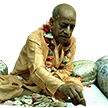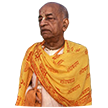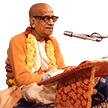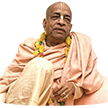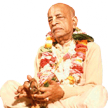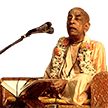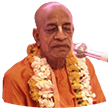Self-realization - an essential subject: Difference between revisions
(Created page with "Category:Essential Subjects <!----------------------- edit below this line -----------------------> <!------------------------ begin introduction text below --------------...") |
(Vanibot #0041: Moves Choose Another box to the end) |
||
| Line 2: | Line 2: | ||
<!----------------------- edit below this line -----------------------> | <!----------------------- edit below this line -----------------------> | ||
<!------------------------ begin introduction text below ------------------------> | <!------------------------ begin introduction text below ------------------------> | ||
All living entities are part and parcel of the Supreme Lord. Unfortunately, in this present civilization both men and women are allowed to be attracted to one another from the very beginning of life, and because of this they are completely unable to come to the platform of self-realization. We do not know that without self-realization we suffer the greatest loss in the human form of life. Thinking of a woman always within one's heart is tantamount to lying down with a woman on a valuable bedstead. The heart is the bedstead, and it is the most valuable bedstead. When a man thinks of women and money, he lies down and rests on the arms of his beloved woman or wife. In this way he overindulges in sex life and thus becomes unfit for self-realization. | |||
Srila Prabhupada's books, lectures, conversations and letters offer a comprehensive presentation of this essential subject as seen in the Vaniquotes '''[[Vaniquotes:Category:Self-realization|Self-realization]]''' category. An introduction from his books is given below in the following | In Bhagavad-gītā it is stated that one who is advanced in spiritual knowledge is not disturbed by the pains and pleasures of the material body. The material body is completely separate from the spirit soul, and the pains and pleasures of the body are superfluous. The practice of austerity and penance is meant for understanding the distinction between the body and the soul and how the soul can be unaffected by the pleasures and pains of the body. Jaḍa Bharata was actually situated on the platform of self-realization. | ||
Srila Prabhupada's books, lectures, conversations and letters offer a comprehensive presentation of this essential subject as seen in the Vaniquotes '''[[Vaniquotes:Category:Self-realization|Self-realization]]''' category. An introduction from his books is given below in the following 10 quotes. | |||
<!-------- end introduction text and don't touch next three lines ---------> | <!-------- end introduction text and don't touch next three lines ---------> | ||
== Quotes from Srila Prabhupada's books == | == Quotes from Srila Prabhupada's books == | ||
<!----------------- edit quote boxes below this line -----------------> | <!----------------- edit quote boxes below this line -----------------> | ||
{{VaniQuotebox| | {{VaniQuotebox|A conditioned soul and a liberated soul may apparently be on the same platform, but factually they are differently engaged, and their attention is always alert, either in sense enjoyment or in self-realization, respectively|The conditioned soul cannot imagine the actual engagements of the liberated soul. While the conditioned soul thus dreams about spiritual engagements, the liberated soul is awake. Similarly, the engagement of a conditioned soul appears to be a dream for the liberated soul. A conditioned soul and a liberated soul may apparently be on the same platform, but factually they are differently engaged, and their attention is always alert, either in sense enjoyment or in self-realization, respectively. '''(Śrīmad-Bhāgavatam 1.4.4)'''}} | ||
{{VaniQuotebox|A human being is thus impeded (by the desires for acquiring a house, possessing land, having children & becoming prominent in society, the affection for community & the place of birth & the hankering for wealth) in his progress toward self-realization| The desires for acquiring a house, possessing land, having children and becoming prominent in society, the affection for community and the place of birth, and the hankering for wealth, which are all like phantasmagoria or illusory dreams, encumber a human being, and he is thus impeded in his progress toward self-realization, the real aim of life. '''(Śrīmad-Bhāgavatam 2.7.6)'''}} | |||
{{VaniQuotebox|A Krsna conscious person, fully engaged in self-realization, has very little time to falsely possess any material object. For maintaining body and soul, he does not require unfair means of accumulating money|A cruel proprietor of an animal sometimes kills the animal in his possession, yet the animal does not protest. Nor does it have any real independence. A Kṛṣṇa conscious person, fully engaged in self-realization, has very little time to falsely possess any material object. For maintaining body and soul, he does not require unfair means of accumulating money. He does not, therefore, become contaminated by such material sins. He is free from all reactions to his actions. '''(Bhagavad-gītā 4.21)'''}} | |||
{{VaniQuotebox| | {{VaniQuotebox|A living entity when he begins spiritual realization by identifying himself with the Supreme Lord. This state of self-realization is technically known as monism. The monist thinks himself one with the Supreme Lord|If someone becomes attached to the principles of salvation or to merging into the existence of the brahmajyoti, his ecstasies gradually diminish into shadow and parā attachment or else transform into the principles of ahaṅgrahopāsanā. This ahaṅgrahopāsanā describes a living entity when he begins spiritual realization by identifying himself with the Supreme Lord. This state of self-realization is technically known as monism. The monist thinks himself one with the Supreme Lord. '''(Nectar of Devotion, Chapter 18)'''}} | ||
{{VaniQuotebox| | {{VaniQuotebox|A person in Krsna consciousness, who eats only food offered to Krsna, can counteract all reactions of past material infections, which are impediments to the progress of self-realization|When there is an epidemic disease, an antiseptic vaccine protects a person from the attack of such an epidemic. Similarly, food offered to Lord Viṣṇu and then taken by us makes us sufficiently resistant to material affection, and one who is accustomed to this practice is called a devotee of the Lord. Therefore, a person in Kṛṣṇa consciousness, who eats only food offered to Kṛṣṇa, can counteract all reactions of past material infections, which are impediments to the progress of self-realization. '''(Bhagavad-gītā 3.14)'''}} | ||
{{VaniQuotebox| | {{VaniQuotebox|It is impossible to realize oneself simply by absorbing oneself in speculation and material activities. One must be very serious about self-realization and the practice of austerity|It is impossible to realize oneself simply by absorbing oneself in speculation and material activities. One must be very serious about self-realization and the practice of austerity. Unfortunately, the people of this age of Kali do not even know the meaning of austerity. '''(Śrīmad-Bhāgavatam 5.19.9)'''}} | ||
{{VaniQuotebox| | {{VaniQuotebox|A very good example is set here: the husband goes away, taking the sannyasa order for self-realization, but his representative, the son, who is equally educated, remains at home to deliver the mother|A very good example is set here: the husband goes away, taking the sannyāsa order for self-realization, but his representative, the son, who is equally educated, remains at home to deliver the mother. A sannyāsī is not supposed to take his wife with him. At the vānaprastha stage of retired life, or the stage midway between householder life and renounced life, one may keep his wife as an assistant without sex relations, but in the sannyāsa order of life one cannot keep his wife with him. Otherwise, a person like Kardama Muni could have kept his wife with him, and there would have been no hindrance to his prosecution of self-realization. '''(Śrīmad-Bhāgavatam 3.24.40)'''}} | ||
{{VaniQuotebox| | {{VaniQuotebox|According to the principles of sanatana-dharma, one must retire from family life after half the duration of life is finished and must engage himself in self-realization| According to the principles of sanātana-dharma, one must retire from family life after half the duration of life is finished and must engage himself in self-realization. But the question of engaging oneself is not always decided. Sometimes retired men are bewildered about how to engage themselves for the last days of life. Here is a decision by authorities like the Pāṇḍavas. All of them engaged themselves in favorably culturing the devotional service of the Lord Śrī Kṛṣṇa, the Supreme Personality of Godhead. '''(Śrīmad-Bhāgavatam 1.15.45)'''}} | ||
{{VaniQuotebox| | {{VaniQuotebox|It is by the mercy of the Lord that one gets all material opulence, but if such material opulence causes one to become puffed up and forget the process of self-realization, the Lord certainly takes all the opulence away|It is by the mercy of the Lord that one gets all material opulence, but if such material opulence causes one to become puffed up and forget the process of self-realization, the Lord certainly takes all the opulence away. The Lord bestows mercy upon His devotee by helping him find out his constitutional position. For that purpose, the Lord is always ready to help the devotee in every way. But material opulence is sometimes dangerous because it diverts one's attention to false prestige by giving one the impression that he is the owner and master of everything he surveys, although actually this is not the fact. '''(Śrīmad-Bhāgavatam 8.22.16)'''}} | ||
{{VaniQuotebox| | {{VaniQuotebox|It is our duty to remember always that in comparison to Dhruva Maharaja we are insignificant. We cannot do anything like what Dhruva Maharaja did for self-realization because we are absolutely incompetent to execute such service|It is our duty to remember always that in comparison to Dhruva Mahārāja we are insignificant. We cannot do anything like what Dhruva Mahārāja did for self-realization because we are absolutely incompetent to execute such service. But by Lord Caitanya's mercy we have been given all concessions possible for this age, so at least we should always remember that neglect of our prescribed duties in devotional service will not make us successful in the mission we have undertaken. '''(Śrīmad-Bhāgavatam 4.8.72)'''}} | ||
<!----------------- edit quote boxes above this line -----------------> | <!----------------- edit quote boxes above this line -----------------> | ||
| Line 30: | Line 36: | ||
'''Self-realization- [[Vaniquotes:Category:Self-realization|explore more within this category]]'''. | '''Self-realization- [[Vaniquotes:Category:Self-realization|explore more within this category]]'''. | ||
{{EsentialSubjectTotal}} | {{EsentialSubjectTotal}} | ||
<div style="float:left;"> | |||
{{EssentialSubjectnav}} | |||
</div> | |||
__NOTOC__ | __NOTOC__ | ||
__NOEDITSECTION__ | __NOEDITSECTION__ | ||
Latest revision as of 17:32, 22 November 2020
All living entities are part and parcel of the Supreme Lord. Unfortunately, in this present civilization both men and women are allowed to be attracted to one another from the very beginning of life, and because of this they are completely unable to come to the platform of self-realization. We do not know that without self-realization we suffer the greatest loss in the human form of life. Thinking of a woman always within one's heart is tantamount to lying down with a woman on a valuable bedstead. The heart is the bedstead, and it is the most valuable bedstead. When a man thinks of women and money, he lies down and rests on the arms of his beloved woman or wife. In this way he overindulges in sex life and thus becomes unfit for self-realization.
In Bhagavad-gītā it is stated that one who is advanced in spiritual knowledge is not disturbed by the pains and pleasures of the material body. The material body is completely separate from the spirit soul, and the pains and pleasures of the body are superfluous. The practice of austerity and penance is meant for understanding the distinction between the body and the soul and how the soul can be unaffected by the pleasures and pains of the body. Jaḍa Bharata was actually situated on the platform of self-realization.
Srila Prabhupada's books, lectures, conversations and letters offer a comprehensive presentation of this essential subject as seen in the Vaniquotes Self-realization category. An introduction from his books is given below in the following 10 quotes.
Quotes from Srila Prabhupada's books
Self-realization- explore more within this category.
Vanipedia has now over 903 introductory articles compiled from Srila Prabhupada's books under the series titled Essential Subjects. All these articles can be seen in the Table of Content on the right side of this article and also here in this Umbrella Category. Browse through them to relish the breadth and depth of Srila Prabhupada's teachings - There is a subject for everyone.

